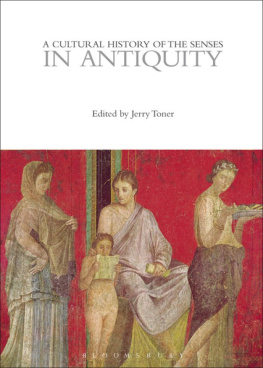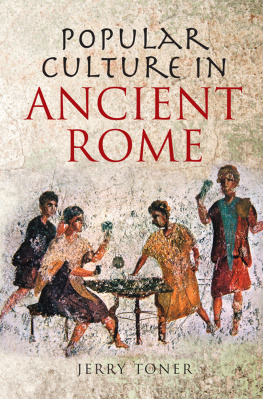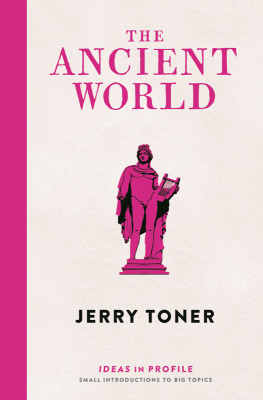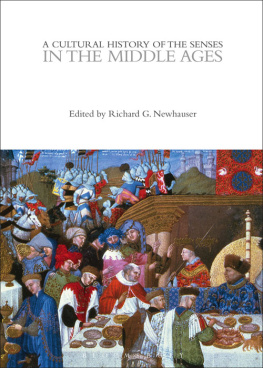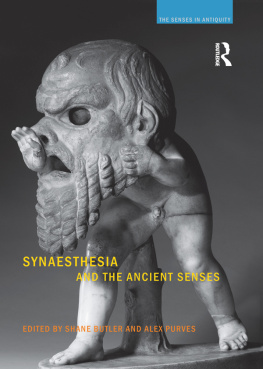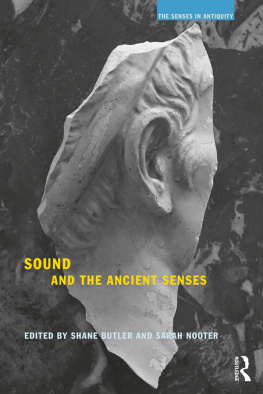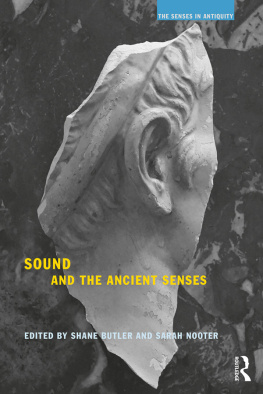

CONTENTS
Jerry Toner
David Potter
Gregory S. Aldrete
Andrew Wallace-Hadrill
Susan Ashbrook Harvey
Ashley Clements
Helen King and Jerry Toner
Silvia Montiglio
Mark Bradley
Benjamin Eldon Stevens
INTRODUCTION
CHAPTER ONE
CHAPTER TWO
CHAPTER THREE
CHAPTER FOUR
CHAPTER SIX
CHAPTER EIGHT
Every effort has been made to trace copyright holders and to obtain their permission for the use of copyright material. The publisher apologizes for any errors or omissions there may be in the credits for the illustrations and would be grateful if notified of any corrections that should be incorporated in future editions of this book.
GENERAL EDITOR, CONSTANCE CLASSEN
A Cultural History of the Senses is an authoritative six-volume series investigating sensory values and experiences throughout Western history and presenting a vital new way of understanding the past. Each volume follows the same basic structure and begins with an overview of the cultural life of the senses in the period under consideration. Experts examine important aspects of sensory culture under nine major headings: social life, urban sensations, the marketplace, religion, philosophy and science, medicine, literature, art, and media. A single volume can be read to obtain a thorough knowledge of the life of the senses in a given period, or one of the nine themes can be followed through history by reading the relevant chapters of all six volumes, providing a thematic understanding of changes and developments over the long term. The six volumes divide the history of the senses as follows:
Volume 1. A Cultural History of the Senses in Antiquity (500 BCE 500 CE )
Volume 2. A Cultural History of the Senses in the Middle Ages (5001450)
Volume 3. A Cultural History of the Senses in the Renaissance (14501650)
Volume 4. A Cultural History of the Senses in the Age of Enlightenment (16501800)
Volume 5. A Cultural History of the Senses in the Age of Empire (18001920)
Volume 6. A Cultural History of the Senses in the Modern Age (19202000)
I would like to thank Constance Classen for giving me the opportunity to exchange ideas with so many classical scholars interested in the growing sphere of sensory history. I would also like to thank her for her good-humored patience in dealing with me. Bloomsbury have done an excellent job in producing the series and I am grateful to their editors for guiding me through the production process.
Introduction: Sensing the
Ancient Past
JERRY TONER
In his True History, the second-century Lucian tells us about his trip to the moon. I am now going to describe, he says, the strange and novel things which I noticed there. Not surprisingly lunar life had many differences to that of a Syrian within the Roman Empire. When a man becomes old, he informs us, he does not die, but dissolves in smoke into the air. Not only that but everyone shares the same diet: they roast figs on a fire but, instead of eating them, people sit around the hearth and sniff up the fumes. This olfactory offering serves them as food. Their drink is air that has been compressed in a cup until it gives off a moisture resembling dew. A handsome man on the moon wears his head bald and his body hairless; but at the same time he has a knee-length beard. These creatures have tails, which are like large evergreen cabbages. Their mucus is a pungent honey, and after hard work or exercise they sweat milk all over, which a drop or two of the honey curdles into cheese. The clothing of the wealthy is soft glass, and of the poor, woven brass, for the land is very rich in brass, which they work like wool after steeping it in water. Lucian hesitates to describe their eyes, fearing that they are so incredible that people will doubt that he is telling the truth. But the fact is, he continues, that they are removable. Their ears are the leaves of plane trees. Another amazing thing was a large mirror in the royal palace, hung over a well. Every word from Earth could be heard rising up through the well, and if you looked in the mirror, you could see every city in close detail. As Lucian says, Anyone who doubts the truth of this statement has only to go there himself to be assured of my veracity.
Not having traveled to the Moon I cannot confirm or deny Lucians observations. But what is clear is that Lucians account of his ancient space travel relied heavily on the alternative use of the senses to generate an idea of how different lunar society was from his own. Lucian was not alone in placing emphasis on the importance of the senses. The ancient world, from classical Greece in the fifth century BCE to the end of the Western Roman Empire in the fifth century CE , used the senses to create and express a huge range of cultural meanings. Religious practices, for example, were fully embodied experiences, which used the senses to establish all kinds of religious meaning (see Chapter 4). Indeed, the senses were functionally significant to all aspects of ancient life, often in a way that was complexly interconnected. Antiquity was also a period of vivid sensations: cities stank, statues were brightly painted, brutal physical punishments were commonplace, and literature made full use of sensory imagery to create its effects. In a steeply hierarchical world, with vast differences between the landed wealthy, the poor, and the slaves, the senses also played a key role in establishing and maintaining boundaries between social groups. This steep social stratification meant that the juxtaposition of the awe-inspiring with the unpleasant was ubiquitous. Visually-dominating buildings such as the Colosseum were well-known places for reeking prostitutes to tout for business.
But the use of the senses in the ancient world was not static. The Roman emperors, for example, employed a powerful range of sensory effects in their architecture and the games to win over the people to their new form of autocratic government after the fall of the republic. New religions such as Christianity developed their own way of using the senses, and acquired their own particular set of sensory-related symbolism. These processes were slow and were often contested. There was rarely any simple agreement about what the senses signified. The aim of this introduction is to provide an overview of these structures and developments, concentrating primarily on the Roman world, and to show how their study can yield a more nuanced understanding of antiquity.
SYNAESTHESIA
Synaesthesia is a term that can often be applied to the ways in which the ancients used the senses. Synaesthesia represents a mixing of the senses, whereby different senses are used to stimulate each other. Antiquity was not a world which saw, as we in the modern West do, the senses as five clearly distinct registers, each with its own particularities. The ancient world was perceived in a way that mixed up the senses to create a rich and complex descriptive palette (see Butler and Purves 2013). Both Greek and Latin literature, for example, make frequent use of such sensory blends. Homers wine-dark sea can be read as an image relating not just to the color, but to its sharp, pungent taste and smell. It may also give some hint of the unsettling feeling of being on a swell. Tasting, smelling, and feeling colors is not something that sits easily with the modern approach to the senses. In part, as Benjamin Eldon Stevens and Silvia Montiglio discuss in their chapters, this difference stemmed from the fact that reading ancient literature was itself a more varied sensory experience. Rather than being simply read, it was designed to be heard. It was natural, in such a context, to taste, hear, and smell what might to us seem purely visual descriptions. It is important to remember that the ancient world was largely oral and aural. Literacy levels were low, with perhaps less than 10 percent being functionally literate and much less than that able to read high literature fluently. Education was expensive and few could afford to allow their children the luxury of learning to enjoy such finery as poetry. But the necessity for literature to be read out aloud meant that writers had to learn to charm their listeners ears. As Montiglio argues, a fundamental quality of good style was vividness, the ability to make audiences see by means of words.
Next page
